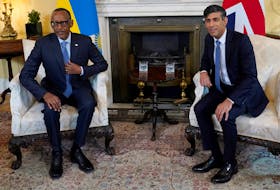Newfoundland and Labrador is a “have” province under Canada’s equalization formula, while at the same time its leadership was asked more than once on Tuesday about the possibility of bankruptcy in the next decade.
The reality is each day brings another reminder of the province’s actual financial status, even as it is offered no assistance through equalization from Ottawa.
The province-to-province picture is striking. Roughly $11 billion of this year’s total of $18 billion in equalization funding will go to Quebec. Apart from the western provinces of British Columbia, Alberta and Saskatchewan, only Newfoundland and Labrador will receive nothing.
RELATED LINK:
Federal transfers to provinces and territories
Provincial Finance Minister Tom Osborne said he is asking for a change, to get something from the transfer program in the future, based on its purpose as set out in the Canadian Constitution. It states equalization is to ensure provinces have the revenue needed to provide reasonably comparable services at reasonably comparable levels of taxation.
Osborne is arguing about the province’s continued ability to offer comparable levels of public services.
He offered the example of Nova Scotia, saying that province has a younger population than Newfoundland and Labrador, but also far smaller footprint. This province has a nation-leading low population density, a rapidly aging population, a shrinking population and high-cost services. Yet Nova Scotia receives $1.9 billion a year in equalization.
“The inclusion of non-renewable resources in the equalization formula will prevent this province from receiving equalization for decades,” Osborne told The Telegram.
He said he has brought his message to the federal minister.
And at the meeting with all finance ministers in Ottawa this week, as the Canadian Press reported, there was some discussion of a federal proposal to factor in non-residential property values to equalization, but with less-than-enthusiastic reception from provinces such as British Columbia and Ontario.
More generally, Osborne said, you can expect opposition to any proposed changes that would provide funding to Newfoundland and Labrador or any of the western provinces and — as a result — less to the provinces currently receiving the transfer.
With that said, Newfoundland and Labrador still has among the highest incomes per capita (after Alberta and Saskatchewan in 2016). And the provincial government has been accused of not doing enough to bring down its spending — something Osborne said the province has been making strides on.
The bottom line?
“My guess is that in 2019, when we start on the new equalization program, it’s going to be the same as the current program,” he said.
MPs support provincial efforts
There is support among Newfoundland and Labrador’s members of Parliament for asking for more from Ottawa.
“I think we need something that recognizes a province like Newfoundland (and Labrador) in the situation it’s in right now financially, with a declining and aging population,” said Avalon MP Ken McDonald.
Looking at the 1997 population versus 2017, for example, Newfoundland and Labrador is the only province to drop in population, according to Statistics Canada.
McDonald said the provincial and federal governments need a best way forward, even if it’s not under the umbrella of equalization.
“We’ve seen it already, the one-offs. We’ve seen the extension to the loan guarantee at Muskrat Falls, and that enabled a free-up of a certain amount of money the province could use to do other work in,” he said.
The agreement is said to have saved roughly $2 billion in financing costs.
“I’m sure all seven of us now as MPs will work hard every day to make sure we get our share on projects, but maybe we can keep working in that direction to get bigger pieces of certain pies.”
Coast of Bays-Central-Notre Dame MP Scott Simms said it’s time for Canada to step back and rethink all of the big three transfers — the Canada Health Transfer, the Canada Social Transfer and equalization.
“We have to have a holistic discussion about all that transfers to the provinces from Ottawa based on need,” Simms said.
“I don’t know if it starts with the premiers. It just takes one of the 14 leaders in this country to say it’s time for us to break bread over what needs to be done over transfers,” he said. “Someone’s got to be brave enough to do this.”
Province on federal stage
Premier Dwight Ball has challenged the province’s “have” status in public debate for years, saying it never really existed, even under the Progressive Conservatives.
In January 2013, he questioned the “have” description when it was used in a television ad from the Newfoundland and Labrador Association of Public and Private Employees (NAPE).
“Most people, if you ask what ‘have’ province means to them, they haven’t felt the impact of that,” Ball said then. “If you’re going to celebrate that, you shouldn’t be celebrating and then have to put the celebration on your credit card. That’s where we’re at now.”
On the news out of the finance meeting, Progressive Conservative Keith Hutchings — who said the focus needs to be where we are now and looking ahead — said more should have been said at the national level by Newfoundland and Labrador before now.
“The reality is you’re in government right now. You’re supposed to have this warm and cozy relationship with the federal government,” Hutchings said.
Hutchings also pointed out the same issues as the Liberal representatives, suggesting Atlantic Canada as a region has “peculiarities” in its demographics and service demands.
“I think we’ve gotten to a point now in this country where we need to start looking at that and at least have a discussion,” he said, confident there were possible options for more federal funds to flow to the province even before 2019.
If not, the expectation is services will ultimately suffer.








